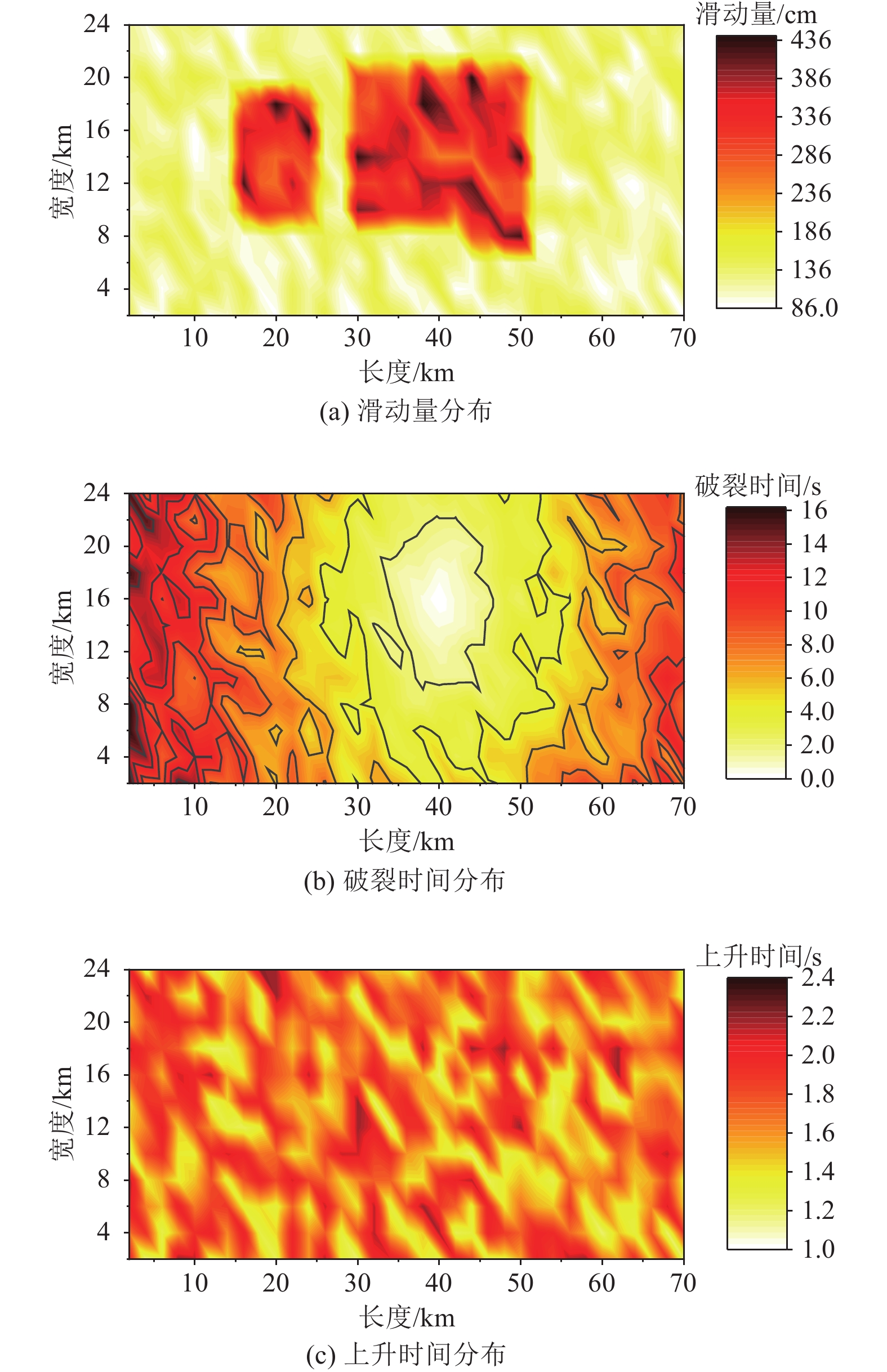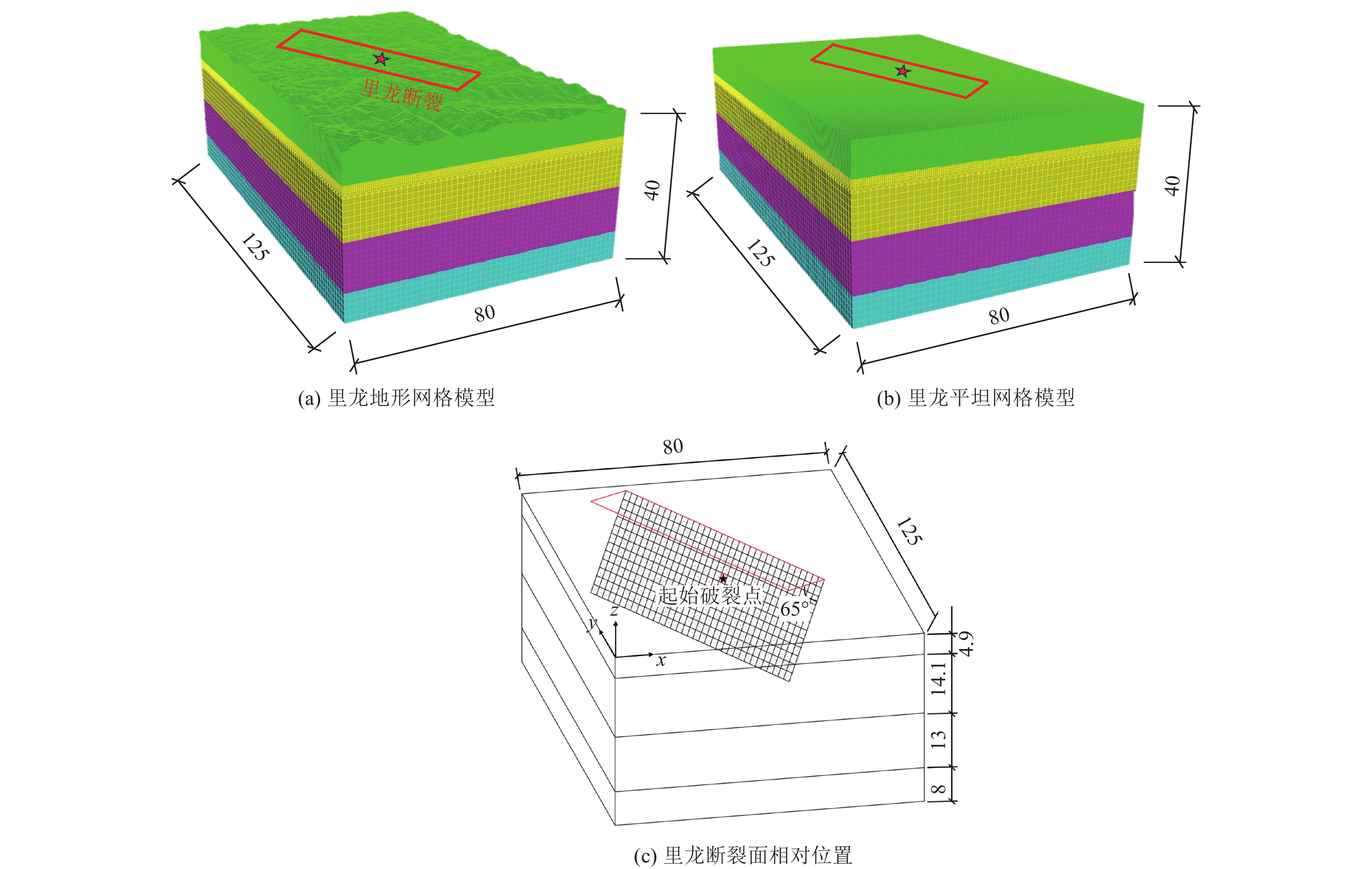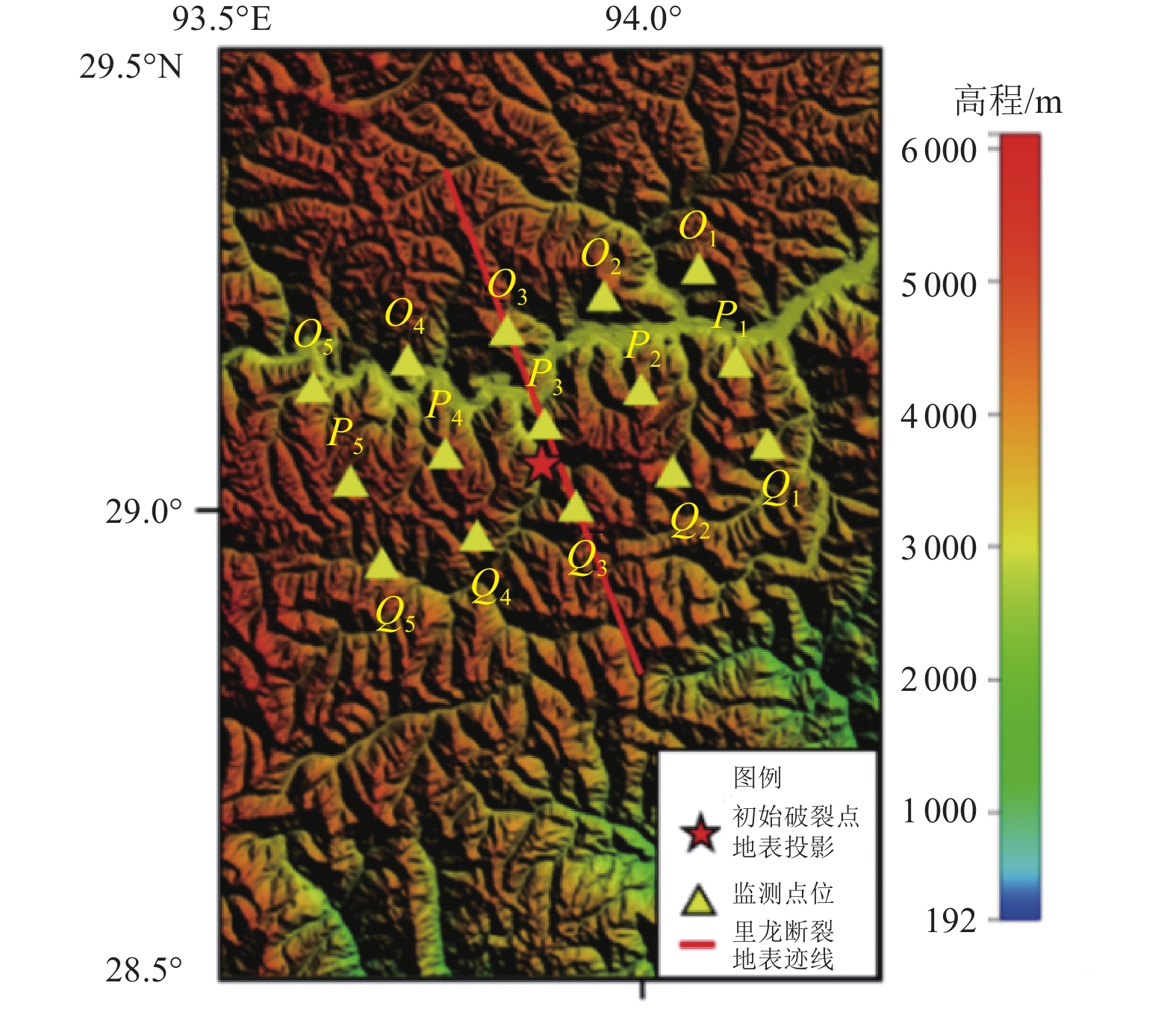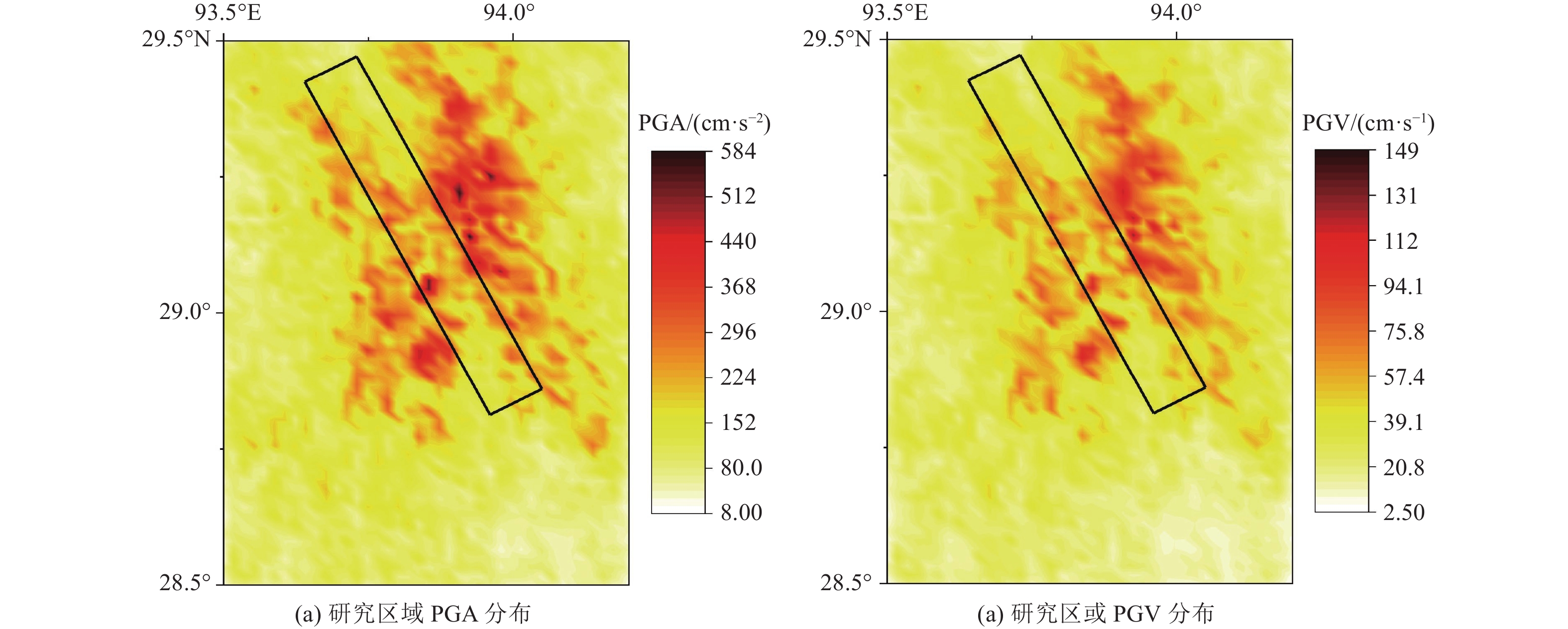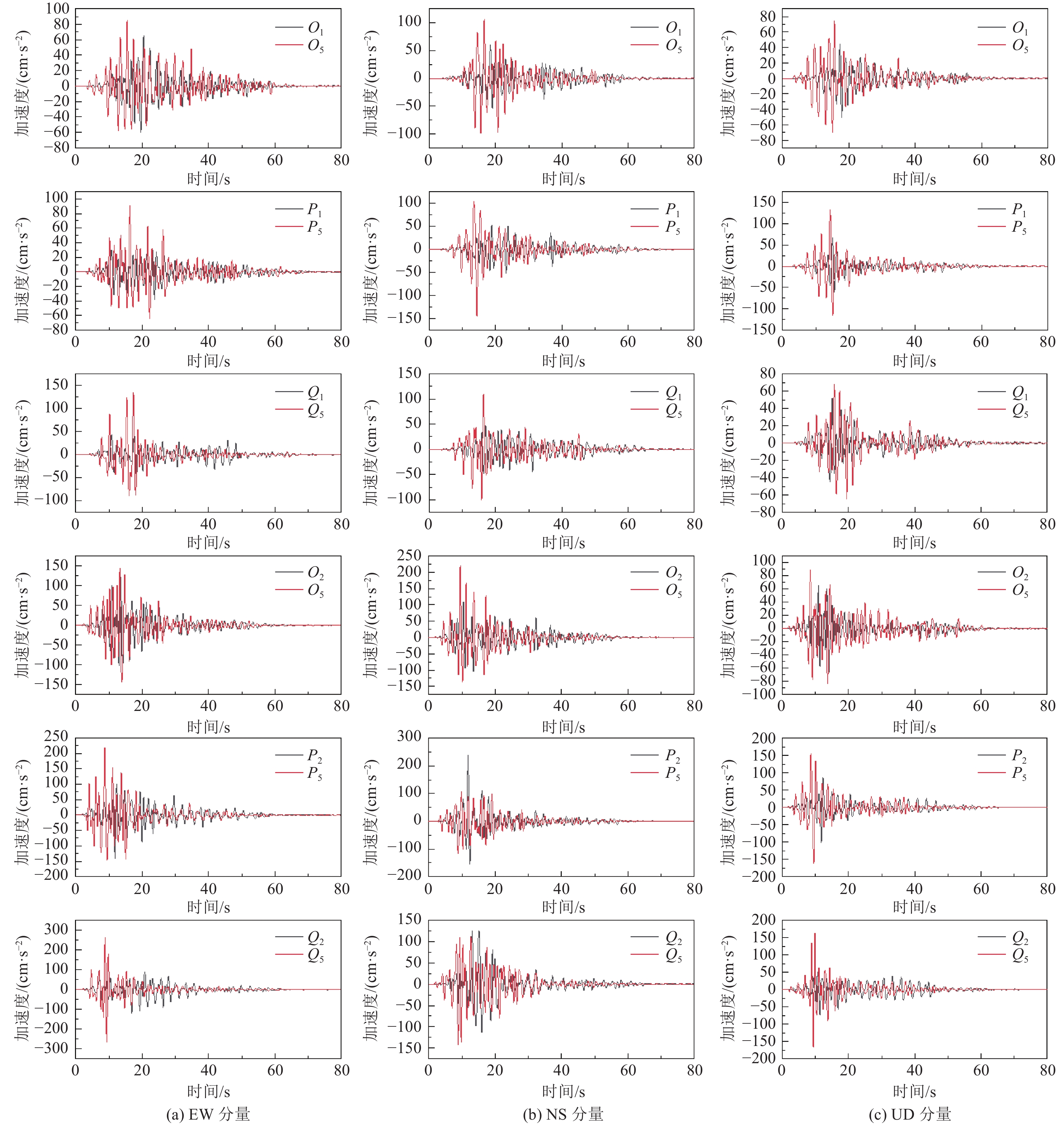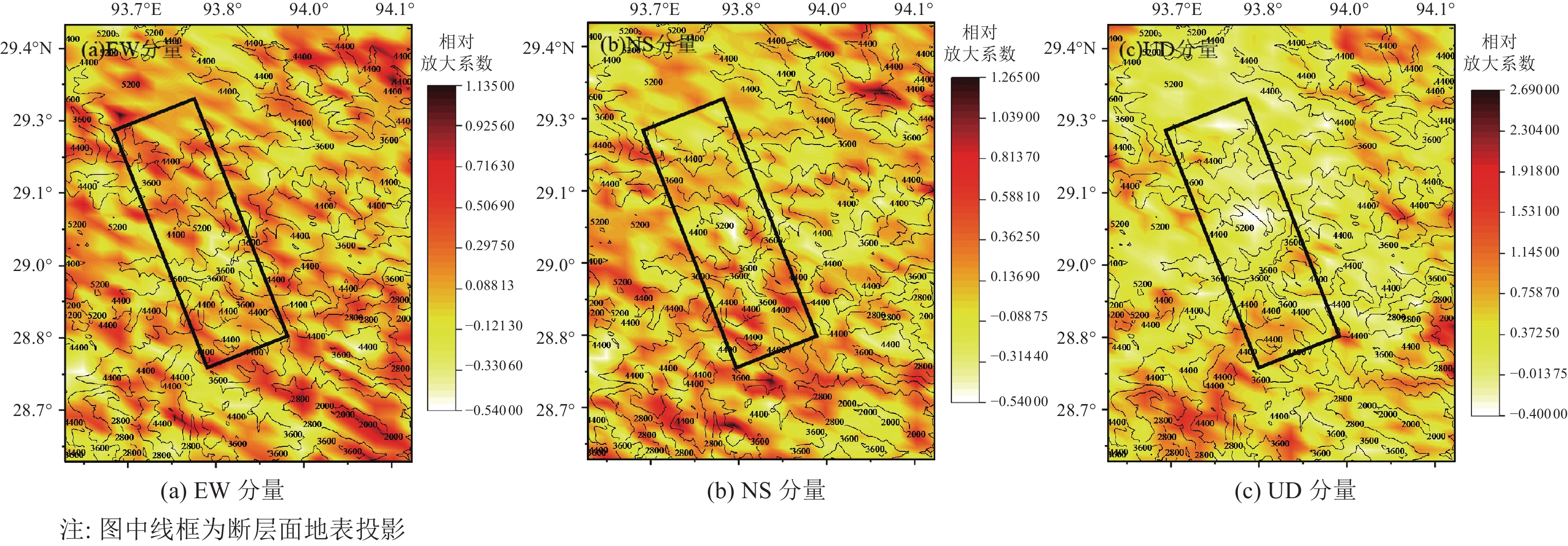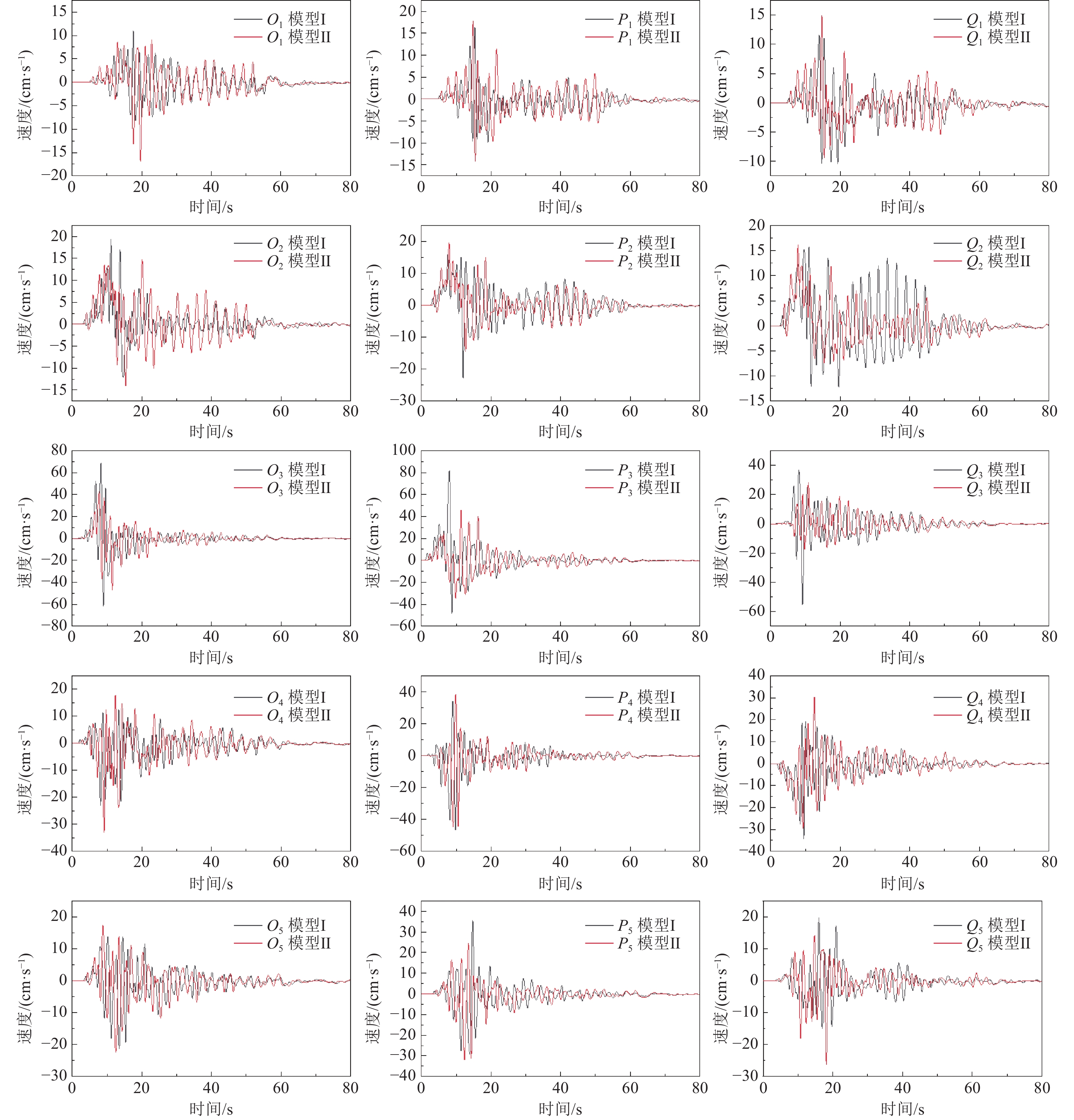Analysis of Simulated Ground Motion Characteristics of the Maximum Potential MW7.4 Earthquake in Lilong Fault
-
摘要: 西藏地区地震构造背景和地形条件复杂,地震活动强烈,强震记录缺乏,因此工程场址近场大震地震动的确定是影响工程开发的关键问题。为揭示高地震烈度区近场大震的地震动特征及高山峡谷地形对地震动的影响规律,本文利用3D谱元法程序和运动学有限断层震源模型,模拟分析里龙断裂发生最大潜在MW7.4地震的近断层地震动效应;通过对比分析基于三维真实地形的DEM分层模型和平坦地形模型的地震动差异,探究地震动的地形效应。结果表明,里龙断裂MW7.4地震的近断层地震动表现出显著的上盘效应和空间分布集中的规律;凸起地形对地震动的放大效应明显,三维真实地形的加速度峰值与平坦地形的模拟结果相比,EW、NS及UD分量的相对放大系数最大分别可达1.135、1.262和2.69,竖向分量的放大系数达水平分量的2倍以上,表明竖向分量地震动受地形效应的影响较水平分量要大得多。
-
关键词:
- 谱元法 /
- 运动学有限断层震源模型 /
- 地震动 /
- 地形效应 /
- 近断层效应
Abstract: The seismic tectonic background and terrain conditions in Xizang are complex, the seismic activity is strong, and the strong earthquake records are lacking. The determination of near-field strong earthquake ground motion at the engineering site is a key issue affecting engineering development. To better understand the ground motion characteristics of large near-fault earthquakes in the high seismic intensity zone , and to examine the influence of alpine canyon topography on ground motion, this study uses a three-dimensional spectral element method (SEM) program alongside a kinematic finite fault source model. The analysis simulates the near-fault ground motion effect of a potential MW 7.4 earthquake along the Lilong fault. By comparing and analyzing ground motion differences between a Digital Elevation Model (DEM) layered, three-dimensional real terrain and a flat terrain model, the study explores the terrain effects on seismic ground motion. The results demonstrate that the near-fault ground motion for a potential MW 7.4 earthquake along the Lilong fault exhibits a pronounced hanging wall effect and spatial distribution concentration. The amplification effect of terrain on ground motion is significant. Compared to the flat terrain model, the peak ground acceleration in the three-dimensional real terrain model is amplified by factors of 1.135, 1.262, and 2.69 for the EW, NS, and UD components, respectively. The amplification factor for the vertical component is more than twice that of the horizontal component, indicating that the vertical component of ground motion is much more affected by terrain effects than the horizontal component. -
表 1 里龙发震断层局部震源参数
Table 1. Local source parameters of Lilong seismogenic fault
局部参数 单位 大凹凸体 小凹凸体 定标率 参数值 定标率 参数值 面积S km2 ${S_{\mathrm{m}}} = 0.16 S$ 268.8 ${S_{\mathrm{o}}} = 0.06 S$ 100.8 平均错动量$\bar D$ cm ${D_{\mathrm{m}}} = 2.01\bar D$ 350 ${D_{\mathrm{o}}} = 0.71\bar D$ 124.3 长度L km $\lg {L_{\mathrm{m}}} = \lg L - 0.48$ 23 $\lg {L_{\mathrm{o}}} = \lg L - 0.69$ 14.3 宽度W km ${W_{\mathrm{m}}} = {{{S_{\mathrm{m}}}} /{{L_{\mathrm{m}}}}}$ 12 ${W_{\mathrm{o}}} = {{{S_{\mathrm{o}}}} / {{L_{\mathrm{o}}}}}$ 7.0 沿走向中心x km $\lg {X_{\mathrm{m}}} = \lg L - 0.32$ 33.5 ${X_{\mathrm{o}}} = 0.44\left( {L - {X_{\mathrm{m}}} - 0.5{L_{\mathrm{m}}}} \right) + {X_{\mathrm{m}}} + 0.5{L_{\mathrm{m}}}$ 56.0 沿倾向中心y km $\lg {Y_{\mathrm{m}}} = \lg W - 0.35$ 10.7 $\lg {Y_{\mathrm{o}}} = \lg W - 0.43$ 8.9 表 2 模型介质参数
Table 2. Model medium parameters
深度/km ρ/(kg·m−3) $v_{\mathrm{P}} $/(m·s−1) $v_{\mathrm{S}} $/(m·s−1) Qμ 0~4.9 1800 4500 2500 50 4.9~19 2400 5900 3100 62 19~32 2600 6100 3500 70 32~40 2900 7100 4100 82 表 3 各测点高程及位置
Table 3. Elevation and location of each measuring point
测点 高程/m 地形位置 断层位置 PGAI/(cm·s−2) PGAII/(cm·s−2) 测点 高程/m 地形位置 断层位置 PGAI/(cm·s−2) PGAII/(cm·s-2) O1 4189 山坡 下盘 65.5 136.5 P4 4379 山顶 上盘 220.0 194.7 O2 3568 山坡 下盘 201.8 243.9 P5 4441 山顶 上盘 144.7 148.5 O3 3076 山坡 迹线 297.3 351.9 Q1 3197 山谷 下盘 51.7 103.2 O4 2983 山谷 上盘 220.6 247.1 Q2 4528 山脊 下盘 125.2 212.8 O5 3772 山谷 上盘 107.3 225.9 Q3 4915 山顶 迹线 422.6 443.8 P1 3435 山坡 下盘 66.5 131.6 Q4 4812 山脊 上盘 266.6 248.2 P2 3700 山坡 下盘 238.0 214.2 Q5 4599 山谷 上盘 134.0 139.8 P3 3463 山坡 迹线 333.4 278.4 表 4 各测点三分量加速度相对放大系数
Table 4. Relative amplification factor of three-component acceleration of each measuring point
分向 FPGA O1 O2 O3 O4 O5 P1 P2 P3 P4 P5 Q1 Q2 Q3 Q4 Q5 EW −0.52 −0.17 −0.18 −0.41 −0.07 −0.64 −0.20 0.20 0.46 −0.30 −0.42 −0.43 −0.05 0.07 −0.04 NS −0.27 −0.23 −0.16 0.24 −0.53 −0.61 0.11 −0.47 0.08 −0.03 −0.53 −0.33 −0.05 −0.13 −0.08 UD −0.13 0.21 0.46 −0.32 0.13 −0.19 0.97 0.74 −0.17 0.17 −0.07 0.78 0.54 0.47 −0.13 -
巴振宁,赵靖轩,梁建文等,2022. 基于有限断层震源模型的北京地区强地震动模拟−以1679年三河−平谷8级地震为例. 地震研究,45(3):479−488.Ba Z. N., Zhao J. X., Liang J. W., et al., 2022. Simulation of strong ground motion in Beijing area based on finite fault source model: Taking the 1679 Sanhe-Pinggu M 8 earthquake as an example. Journal of Seismological Research, 45(3): 479−488. (in Chinese) 蔡晓亮,2014. 西藏米林地区断裂活动性及构造稳定性评价. 成都:成都理工大学.Cai X. L., 2014. Characteristics of fault's activity and assessment on the tectonic stability of Milin,Tibet. Chengdu:Chengdu University of Technology. (in Chinese) 郭金萍,陈学良,高孟潭等,2015. 运动学震源模型对近断层长周期地震动模拟研究综述. 世界地震工程, 31 (4):226−235.Guo J. P. , Chen X. L. , Gao M. T. , et al. Review of long period strong ground motion simulations at near-field based on kinematic source models. World Earthquake Engineering, 2015, 31 (4): 226−235. (in Chinese) 郝明辉,张郁山,2014. 凸起地形对地震动特性的影响. 地震学报, 36 (5):883−894.Hao M. H. , Zhang Y. S. , 2014. Analysis of terrain effect on the properties of ground motion. Acta Seismologica Sinica, 2014, 36 (5): 883−894. (in Chinese) 蒋涵,周红,高孟潭,2015. 三维地形中地震动的频域特征−−以芦山地区为例. 震灾防御技术,10(1):59−67.Jiang H., Zhou H., Gao M. T., 2015. The characteristics of frequency domain of ground motion in 3-D topography−−a case study of Lushan area. Technology for Earthquake Disaster Prevention, 10(1): 59−67. (in Chinese) 姜伟,陶夏新,陶正如等,2017. 有限断层震源模型局部参数定标律. 地震工程与工程振动,37(6):23−30.Jiang W., Tao X. X., Tao Z. R., et al., 2017. Scaling laws of local parameters of finite fault source model. Earthquake Engineering and Engineering Vibration, 37(6): 23−30. (in Chinese) 李保昆,刁桂苓,邹立晔等,2014. 1947年西藏朗县东南 M 7.7大地震震源参数复核. 地震地磁观测与研究,35(1-2):85−91.Li B. K., Diao G. L., Zou L. Y., et al., 2014. A big earthquake with M 7.7 was occurred in the southeast of Lang county in Tibet on July 29, 1947. Seismological and Geomagnetic Observation and Research, 35(1-2): 85−91. (in Chinese) 廖力,2017. 首都圈地震动三维地形效应谱元法模拟. 地震地磁观测与研究,38(1):7−14.Liao L., 2017. Simulation of three-dimensional topographic effects on seismic ground motion in Capital region based upon the spectral-element method. Seismological and Geomagnetic Observation and Research, 38(1): 7−14. (in Chinese) 刘启方,2005. 基于运动学和动力学震源模型的近断层地震动研究. 哈尔滨:中国地震局工程力学研究所.Liu Q. F., 2005. Studies on near-fault ground motions based on kinematic and dynamic source models. Harbin:Institute of Engineering Mechanics,China Earthquake Administration. (in Chinese) 万志文,钟菊芳,2023. 利用谱元法研究震源参数对于近断层地震动上盘效应的影响. 震灾防御技术,18(03):450−461.Wan Z. W., Zhong J. F., 2023. The influence of source parameters on the hanging wall effect of near-fault ground motion is studied by spectral element method. Technology for Earthquake Disaster Prevention, 18(03): 450−461. (in Chinese) 万子轩,2020. 基于谱元法的地震动放大效应研究−以青川县斜坡为例. 四川地震,(1):10−15.Wan Z. X., 2020. Investigations of topographic effects on ground motion based on the spectral element methods−a study case in slopes of Qingchuan county. Earthquake Research in Sichuan, (1): 10−15. (in Chinese) 王立刚,2022. 运动学有限断层震源在SPECFEM3D中的初步实现. 哈尔滨:中国地震局工程力学研究所.Wang L. G., 2022. The primary implementation of kinematic finite-fault source models in SPECFEM3D. Harbin:Institute of Engineering Mechanics,China Earthquake Administration. (in Chinese) 王伟,2011. 地震动的山体地形效应. 哈尔滨:中国地震局工程力学研究所.Wang W., 2011. Effect of hill topography on ground motion. Harbin:Institute of Engineering Mechanics,China Earthquake Administration. (in Chinese) 谢平,唐方头,梁小华等,2017. 南迦巴瓦构造结西侧里龙断裂晚第四纪活动特征. 震灾防御技术,12(3):480−490.Xie P., Tang F. T., Liang X. H., et al., 2017. Late quaternary movement characteristics of Lilong fault at the west side of Namcha Barwa Syntaxis. Technology for Earthquake Disaster Prevention, 12(3): 480−490. (in Chinese) 杨建亚,白玲,李国辉等,2017. 东喜马拉雅构造结地区地震活动及其构造意义. 国际地震动态,(6):12−18.Yang J. Y., Bai L., Li G. H., et al., 2017. Seismicity in the eastern Himalayan syntaxis and its tectonic implications. Recent Developments in World Seismology, (6): 12−18. (in Chinese) 张冬丽,陶夏新,周正华,2005. 关于有限断层计算模型的研究−考虑位错时、空不均匀分布的滑动时间函数. 西北地震学报, 27 (3):193−198.Zhang D. L. , Tao X. X. , Zhou Z. H. , 2005. Study on finite fault model for calculation--considering slip-time function of heterogeneous displacement distribution in temporal and spatial domain. China Earthquake Engineering Journal, 27 (3): 193−198. (in Chinese) 朱向锋,黄春长,庞奖励等,2010. 渭河天水峡谷全新世特大洪水水文学研究. 地理科学进展,29(7):840−846.Zhu X. F., Huang C. C., Pang J. L., et al., 2010. Palaeo-hydrologrcal studies of the Holocene extreme floods in the Tianshui gorges of the Weihe river. Progress in Geography, 29(7): 840−846. (in Chinese) Brocher T. M., 2008. Key elements of regional seismic velocity models for long period ground motion simulations. Journal of Seismology, 12(2): 217−221. doi: 10.1007/s10950-007-9061-3 Celebi M., 1987. Topographical and geological amplifications determined from strong-motion and aftershock records of the 3 March 1985 Chile earthquake. Bulletin of the Seismological Society of America, 77(4): 1147−1167. doi: 10.1785/BSSA0770041147 Chaljub E., Komatitsch D., Vilotte J. P., et al., 2007. Spectral-element analysis in seismology. Advances in Geophysics, 48: 365−419. Davis L. L., West L. R., 1973. Observed effects of topography on ground motion. Bulletin of the Seismological Society of America, 63(1): 283−298. doi: 10.1785/BSSA0630010283 Hanks T. C., Kanamori H., 1979. A moment magnitude scale. Journal of Geophysical Research: Solid Earth, 84(B5): 2348−2350. doi: 10.1029/JB084iB05p02348 Komatitsch D. , Labarta J. , Michéa D. , 2008. A simulation of seismic wave propagation at high resolution in the inner core of the earth on 2166 processors of MareNostrum. In: Proceedings of the 8th International Conference on Vector and Parallel Processing. Toulouse: Springer, 364−377. Komatitsch D., Xie Z. N., Bozdağ E., et al., 2016. Anelastic sensitivity kernels with parsimonious storage for adjoint tomography and full waveform inversion. Geophysical Journal International, 206(3): 1467−1478. doi: 10.1093/gji/ggw224 Lee S. J., Chen H. W., Liu Q. Y., et al., 2008. Three-dimensional simulations of seismic-wave propagation in the Taipei basin with realistic topography based upon the spectral-element method. Bulletin of the Seismological Society of America, 98(1): 253−264. doi: 10.1785/0120070033 Lee S. J., Chan Y. C., Komatitsch D., et al., 2009. Effects of realistic surface topography on seismic ground motion in the Yangminshan region of Taiwan based upon the spectral-element method and LiDAR DTM. Bulletin of the Seismological Society of America, 99(2A): 681−693. doi: 10.1785/0120080264 Parvez I. A., Vaccari F., Panza G. F., 2003. A deterministic seismic hazard map of India and adjacent areas. Geophysical Journal International, 155(2): 489−508. doi: 10.1046/j.1365-246X.2003.02052.x Peter D., Komatitsch D., Luo Y., et al., 2011. Forward and adjoint simulations of seismic wave propagation on fully unstructured hexahedral meshes. Geophysical Journal International, 186(2): 721−739. doi: 10.1111/j.1365-246X.2011.05044.x Somerville P., Irikura K., Graves R., et al., 1999. Characterizing crustal earthquake slip models for the prediction of strong ground motion. Seismological Research Letters, 70(1): 59−80. doi: 10.1785/gssrl.70.1.59 Wang G. Q., Boore D. M., Igel H., et al., 2003. Some observations on colocated and closely spaced strong ground-motion records of the 1999 Chi-Chi, Taiwan, earthquake. Bulletin of the Seismological Society of America, 93(2): 674−693. doi: 10.1785/0120020045 Wells D. L., Coppersmith K. J., 1994. New empirical relationships among magnitude, rupture length, rupture width, rupture area, and surface displacement. Bulletin of the seismological Society of America, 84(4): 974−1002. doi: 10.1785/BSSA0840040974 Wong H. L., Jennings P. C., 1975. Effects of canyon topography on strong ground motion. Bulletin of the seismological Society of America, 65(5): 1239−1257. Xin H. L., Zhang H. J., Kang M., et al., 2019. High-resolution lithospheric velocity structure of continental China by double-difference seismic travel-time tomography. Seismological Research Letters, 90(1): 229−241. doi: 10.1785/0220180209 -



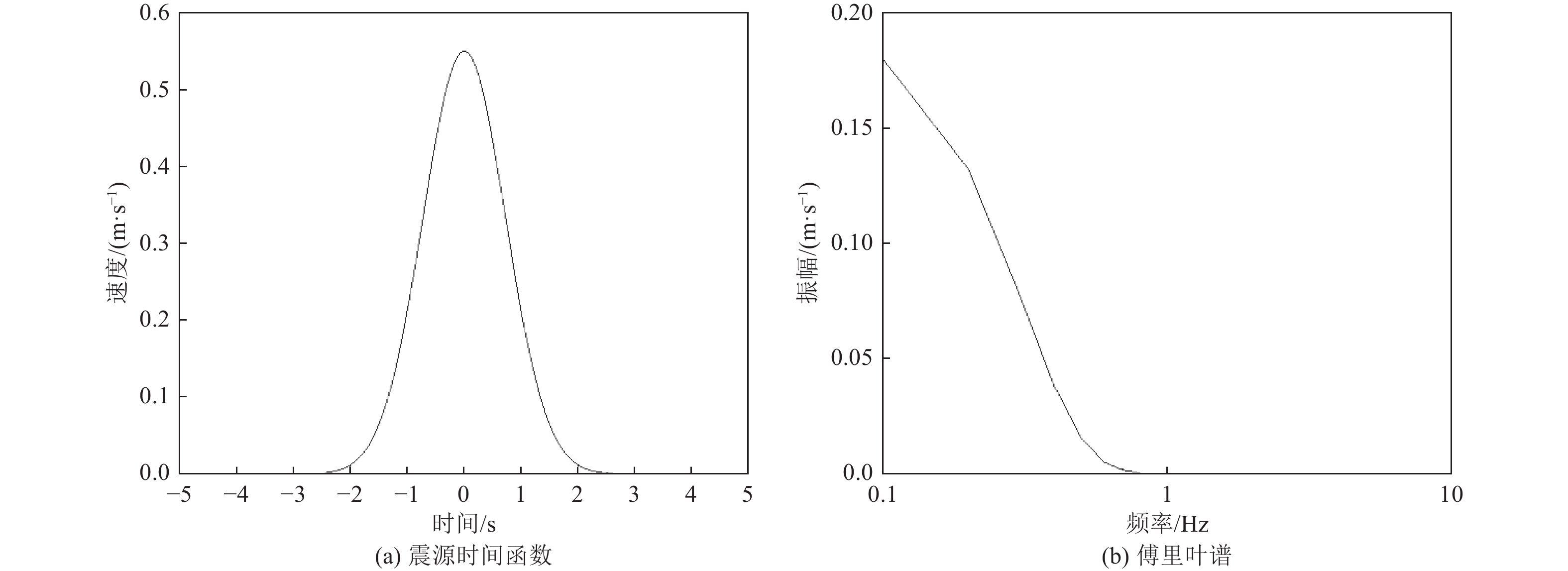
 下载:
下载:
